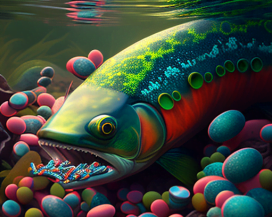
BSF in Aquaculture: A Sustainable Protein Source
As global demand for seafood rises, the aquaculture industry faces challenges in sourcing sustainable, high-quality feed and feed ingredients. The demand is expected to increase as soy-based fish-meals are becoming more expensive when human food consumption requires more soy as a food protein source, the over-fishing of seas is a global topic and may force restrictions on fishing, and of course the sustainability premio is high with insect-based protein sources, again redirecting consumption from actual fish-based feeds and soy-based feed towards insect-based feeds.
One promising solution focusing on sustainable feed production is the use of black soldier fly (BSF) larvae as a nutrient-rich alternative to traditional fishmeal and soymeal. The use of BSF in aquaculture offer numerous benefits for fish farming while promoting environmental sustainability, not to talk about the fact that the larvae are natural food for many fish species and the larvae doesn’t often even need post-processing, but can be fed to the fish and shrimps live, directly from the production units aka insect farms. Let’s take a look at five factors that advocate the use of BSF in aquaculture as a protein source.
1. A High-Protein Feed Alternative
BSF larvae contain up to 45% protein and essential amino acids, making them an excellent substitute for fishmeal and soybean-based feeds. Studies have shown that fish, including tilapia and trout, can thrive on diets incorporating BSF meal, leading to healthy growth rates and improved feed conversion efficiency.
2. Rich in Essential Nutrients
Beyond protein, BSF larvae are a natural source of lipids, calcium and antimicrobial peptides, which support fish health and immune function. The larvae’s fatty acid profile is comparable to fish oil, providing key nutrients needed for optimal fish development.
3. Reducing Pressure on Marine Resources
The aquaculture industry relies heavily on fishmeal, often derived from wild-caught fish, contributing to overfishing. By replacing fishmeal with BSF larvae, fish farms can significantly reduce their ecological footprint while ensuring a sustainable feed supply. Already fish farms across the globe from Norway to South East Asia and across Africa are turning towards insect-based diets.
4. Waste Upcycling and Circular Economy
BSF larvae can be grown on organic waste, including food scraps and agricultural byproducts, but also fish production leftovers. This upcycling process converts waste into high-value feed, reducing environmental pollution and supporting a circular economy approach in aquaculture.
5. Cost-Effective and Scalable Solution
Compared to traditional fishmeal, BSF farming is more affordable and scalable, requiring fewer resources such as land and water. This makes the use of BSF in aquaculture an economically viable option for both small-scale and industrial fish farms.
Conclusion
Black soldier flies are revolutionizing aquaculture by providing a sustainable, nutrient-rich and cost-effective alternative to conventional fish feeds. As the industry seeks eco-friendly solutions, BSF larvae stand out as a game-changer in ensuring the long-term viability of fish farming.
Want to know more about the business side of insect farming? Join the free Insect FARM Hub and watch the video tutorials and webinar recordings and start testing your business case with Manna Insect’s free BSF business case calculator.
Learn more about BSF farming in the
Insect Farm Hub!
Manna Insect has launched a comprehensive insect farming platform designed for learning, managing, monitoring and networking. There are tons of free content about insect farming, as well as a lot of paid premium content, that dives even deeper in black soldier fly business.
